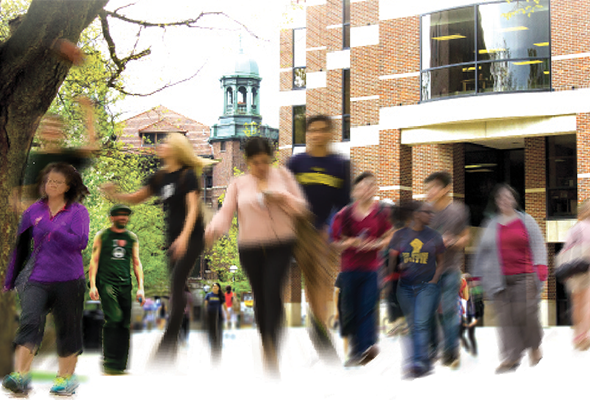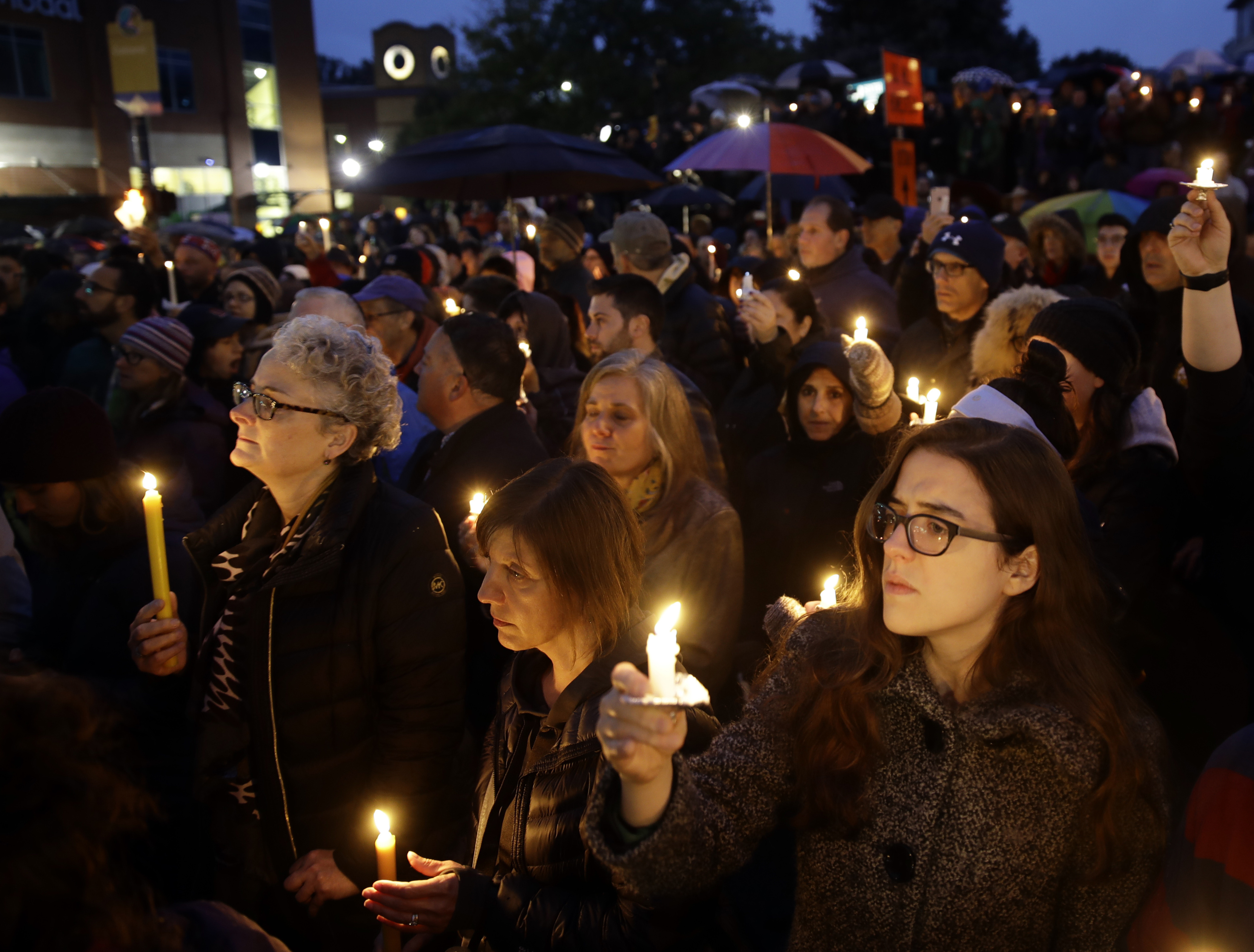Transparent Teaching: A Focus of This Year’s Inclusive Teaching @ Michigan Series
What does ‘transparency’ mean in a teaching-learning context, and why is it a key principle featured in many CRLT workshops and resources about inclusive teaching? 
What does ‘transparency’ mean in a teaching-learning context, and why is it a key principle featured in many CRLT workshops and resources about inclusive teaching? 
We wish we did not have so many occasions to provide guidance to instructors on teaching in the wake of hate-based violence. As our campus processes the news coming out of New Zealand today, we offer this slight update of a blog from October.
In the wake of the massacre of worshippers at New Zealand mosques, many people in our community are feeling threatened and terrorized, grieving deeply, experiencing intense anger, or fighting a sense of despair at a swelling of hatred and violence in our world. These emotions enter our classrooms, studios, and labs, and they can understandably and significantly affect students’ ability to focus on their learning and work with peers in intellectual community.
are feeling threatened and terrorized, grieving deeply, experiencing intense anger, or fighting a sense of despair at a swelling of hatred and violence in our world. These emotions enter our classrooms, studios, and labs, and they can understandably and significantly affect students’ ability to focus on their learning and work with peers in intellectual community.
The Diversity and Inclusive Teaching (DIT) Seminar is co-developed by the Center for Research on Learning and Teaching (CRLT) and The Program on Intergroup Relations (IGR), with support from Rackham Graduate School and IGR. In this five-week seminar participants have the opportunity to learn about and practice a range of effective facilitation strategies for use in U-M's classrooms. We will focus on pedagogical techniques that productively engage instructor and student identities and experiences in the learning process, as well as balance different voices and views. We will also discuss strategies for managing resistance and conflict in the classroom.
Seminar objectives
This seminar will survey a broad range of diversity and identity-related issues that present themselves in classrooms and other learning environments. The curriculum over the five weeks will explore how social identities and diversity impact student and instructor experiences. The seminar will explore issues related to:
the relationship between instructor identity and inclusive teaching
balancing power and participation in the classroom
strategies for working through potential “hot moments” and conflict

*updated November 7, 2018
During U-M's Veterans Week, it's a good time to reflect on the needs of our students who have served in the military. Did you know that record numbers of veterans are enrolling in U.S. colleges and universities--and many of them are here on U-M's campuses? Since January 2014, the university's tuition policy has allowed students who have served in the military to qualify for in-state tuition. If you teach at U-M, odds are good you've had or will have student veterans in your classroom.
How might your awareness of veterans in the classroom make a difference in your teaching? The research on student veterans suggests several strategies and cautions for teaching inclusively with veterans in mind. Here are a few:
Through programs, consultations, and resources, the Center for Research on Learning and Teaching (CRLT) helps cultivate teaching-learning environments where instructors and students of all identities and backgrounds can excel.
For more information and to register, click on the individual titles below.
Teaching for Inclusion and Equity (GSIs/Postdocs & Faculty) October 16, 10:00AM-12:00PM
Principles and Practices of Anti-Racist Pedagogy (GSIs/Postdocs & Faculty) October 17, 1:00PM-3:00PM
Accessibility in Large Courses (Faculty) October 23, 1:00PM-3:00PM
Applying Principles of Transparency in Classroom Discussions (GSIs/Postdocs & Faculty) November 4, 2:00PM-4:00PM
Disrespect and Disruption in the Classroom: Strategies for Prevention and Response (GSIs & Postdocs) November 11, 10:00AM-12:00PM
In recent years, several colleges and universities have begun to include students more actively in faculty professional development opportunities, often engaging students to consult with faculty about both course planning and implementation. In a recent book on Engaging Students as Partners in Learning and Teaching, Alison Cook-Sather, Catherine Bovill, and Peter Felten delineate a range of positive outcomes of such student-faculty partnerships to improve teaching and learning. As these authors argue, “Students have insights into teaching and learning that can make [instructors’] practice more engaging, effective, and rigorous” (2014).

This year, as part of our 2018 Inclusive Teaching @ Michigan series (April 30 - May 4), CRLT will pilot two programs that include undergraduate student consultants as key partners for faculty who wish to think about course design in collaboration with students. These include:
Equity-focused teaching is a corrective tool that moves beyond inclusion. It is based on the understanding that systemic inequities shape all students’ individual and group-based experiences of social identity and thus produce vastly different relationships of power in and outside of the classroom. How do we define “equity-focused teaching” at U-M? CRLT uses the following definition, which synthesizes a range of research related to teaching and learning, the expertise of our DEI consultants, as well as ideas collected in faculty focus groups:
What do you know about the students in your classroom? How many of them are first generation? Who among them has served in the military? Which ones are in recovery for substance use? Who has children at home that they are responsible for? Are there other dimensions of your students' experiences that might fall outside of 'traditional' expectations for U-M students?
According to a recent focus group study conducted by U-M’s Center for the Education of Women, 92% of student respondents who identify as “nontraditional” identified multiple markers of nontraditional status and 38% percent of respondents described their nontraditional status as a combination of five or more identities or life experiences. While some of these statuses were linked to visible identity categories, many of them were based on experiences that are not readily legible (e.g., being a veteran or being a commuter). However, these nontraditional experiences play a key role in how students experience the university, both inside and beyond the classroom. So how can instructors better understand these experiences to leverage diversity in the classroom and create inclusive learning environments?
 We return to teaching this semester in the wake of deadly white supremacist violence in Charlottesville and groundswells of resistance around the country. At such a critical moment in our nation’s history, instructors across campus are especially aware of how broader national conversations, conflicts, and movements are likely to enter and affect their classrooms, labs, and studios. As college campuses are being targeted by hate groups, the potential for violence on campus feels very real. President Schlissel has said, “The actions of the hate groups and white supremacists who caused death and injury in Charlottesville are a horrific reminder that there are those among us who would use our differences in the name of evil. Their despicable bigotry is antithetical to our values at the University of Michigan and to all we hold dear as an academic community.” It’s an anxious time to be starting to teach.
We return to teaching this semester in the wake of deadly white supremacist violence in Charlottesville and groundswells of resistance around the country. At such a critical moment in our nation’s history, instructors across campus are especially aware of how broader national conversations, conflicts, and movements are likely to enter and affect their classrooms, labs, and studios. As college campuses are being targeted by hate groups, the potential for violence on campus feels very real. President Schlissel has said, “The actions of the hate groups and white supremacists who caused death and injury in Charlottesville are a horrific reminder that there are those among us who would use our differences in the name of evil. Their despicable bigotry is antithetical to our values at the University of Michigan and to all we hold dear as an academic community.” It’s an anxious time to be starting to teach.
As we move into the semester, we offer some guidance about related questions and concerns we have been hearing from a range of U-M instructors. Each topic below can be expanded by clicking the small arrow at the left.
Faculty and GSIs from across campus are invited to register for the second annual Inclusive Teaching @ Michigan series. Instructors can register for any or all of over 15 workshops, panels, and presentations focused on a range of inclusive teaching topics. Sessions are free and open to U-M instructors in any field.
Events will kick off with a session featuring the CRLT Players theatre program, focused on building resiliently inclusive classroom climates. Throughout the series, CRLT facilitators will be joined by collaborators including The Program on Intergroup Relations (IGR), the Center for Engaged Academic Learning (CEAL), the Ginsberg Center, Women in Science and Engineering (WISE), and the Lecturers' Employment Organization's (LEO's) Anti-Racism Task Force to offer sessions that help instructors develop awareness and skills in areas including:
Some sessions are designed particularly for instructors who are relatively new to conversations about inclusive teaching. Most are designed for a broad range of instructors, including those who are seeking to develop their established inclusive teaching practices.
See the full schedule of events here. Anyone who participates in an Inclusive Teaching @ Michigan workshop is invited to join us at a catered closing lunch where we will reflect together upon the series and ways to continue developing the conversation about inclusive teaching among U-M colleagues.